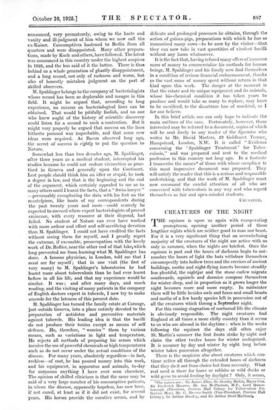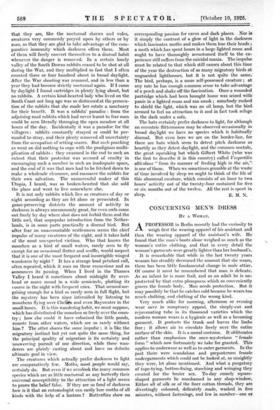CREATURES OF THE NIGHT
THE equinox is upon us again with exasperating promptness, opening another period of those lengthier nights which are neither good to man nor beast. For it is a very significant thing that an overwhelming majority of the creatures of the night are active with us only in summer, when the nights are briefest. Once the equinox is past and the hours of darkness begin to out- number the hours of light the bats withdraw themselves circumspectly into hollow trees and the crevices of ancient buildings, moths and night-flying insects become steadily less plentiful, the nightjar and the stone curlew migrate southwards, squirrels and dormice compose themselves for winter sleep, and in proportion as it grows longer the night becomes more and more empty. In midwinter there will be little besides owls and foxes and small beasts and moths of a few hardy species left in possession out of all the creatures which throng a September night.
For this coming stagnation of nocturnal life the climate is obviously responsible. The night creatures find England at all times a more chilly country than it seems to us who are abroad in the daytime : when in the weeks following the equinox the days still often enjoy St. Martin's summer the first frosts strike by night and claim the other twelve hours for winter undisguised. It is summer by day and winter by night long before winter takes possession altogether.
There is the suspicion also about creatures which con- tinue active all through the extended hours of darkness that they do it not from choice but from necessity. What real need is there for hares or rabbits or wild ducks or wild geese to avoid feeding by daylight ? Only, it seems, The names are : Sir James Allen, Sir Stanley Birkin, Major-Gen. Sir Frederick Maurice, Mr. Ian McPherson, M.P., Lord Queen- borough (President, Preston Hall Colony for Tuberculous Ex- Service Men), Mr. G. Rewes-Smith (Vice-President, Preston Hall Colony), Sir Arthur Stanlay, and Sir Arthur Steel-Maitland. that they are, like the nocturnal shrews and voles, creatures very commonly preyed upon by others or by man, so that they are glad to take advantage of the com- parative immunity which darkness offers them. Most of them will freely convert themselves to a diurnal habit whenever the danger is removed. In a certain lonely valley of the South Downs rabbits ceased to be shOt at all during the War, and they multiplied so fast that I often counted three or four hundred about in broad daylight. After the War shooting. was resumed, and in less than a year they had become strictly nocturnal again. If I came by daylight I found cartridges in plenty lying about, but no rabbits. A certain kind-hearted lady who lived on the South Coast not long ago was so distressed at the persecu- tion of the rabbits that she made her estate a sanctuary for their benefit. It was a rabbits' paradise : from the adjoining road rabbits which had never learnt to fear man could be seen literally thronging the open meadow at all hours of the day. Incidentally it was a paradise for the villagers : rabbits constantly strayed or could be per- suaded to stray, and their plenty removed all uncertainty from the occupation of setting snares. But such poaching as went on did nothing to cope with the prodigious multi- plication of rabbits : they swarmed in the end to such an extent that their protector was accused of cruelty in encouraging such a number in such an inadequate space, and the end of it was that men had to be fetched down to make a wholesale clearance, and massacre the rabbits for their own salvation. The unsuccessful maker of this Utopia, I heard, was so broken-hearted that she sold the place and went to live somewhere else.
It is not only rabbits which live as creatures of day or night according as they are let alone or persecuted. In game-preserving districts the amount of activity in darkness is always uncommonly great, for even owls come out freely by day where shot does not forbid them and the little owl, that unpopular introduction from the Nether- lands, is in some parts practically a diurnal bird. But after fear an unaccountable restlessness seems the chief impulse of many creatures of the night, and it takes hold of the most unexpected victims. Who that knows the moorhen as a bird of small waters, rarely seen to fly except for an occasional flutter and scuffle, would suspect that it is one of the most frequent and incorrigible winged wanderers by night ? It has a strange loud petulant call, often repeated, which it uses on these excursions and so announces its passing. When I lived in the Thames Valley I heard it sometimes about midnight fly over- head or move round in a wide semicircle, plotting its course in the night with frequent cries. That seemed sur- prising enough for a bird so rarely, seen in full flight, but the mystery has been since intensified by listening to moorhens flying over Chefs and even Bayswater in the small hours. It is this wandering habit, we must suppose, which has distributed the moorhen so freely over the coun- try ; how else could it have colonized the little ponds, remote from other waters, which are so rarely without him The otter shares the same impulse ; it is like the migratory instinct but yet not quite the same thing, for the principal quality of migration is its certainty and ' unswerving pursuit of one direction, while these wan- derers are plainly casting about and have no definite ultimate goal in view.
The creatures which actually. prefer darkness to light are comparatively few. Moths, most people would say, certainly do. But even if we overlook the many common species which are as little nocturnal as any butterfly their universal susceptibility to the attraction of a light seenis to prove the belief false. If they are so fond of darkness how is it that an entomologist can easily lure moths of all kinds with the help of a lantern ? Butterflies show no corresponding passion for caves and dark places. Nor is it simply the contrast of a glow of light in the darkness which fascinates moths and makes them lose their heads ; a moth which has spent hours in a large lighted room and ought to have thoroughly accustomed itself to the ex- perience still suffers from the suicidal mania. The impulse must be related to that which still causes about this time of the year the destruction of so many migratory birds at unguarded lighthouses, but it is not quite the same.' The bird, perhaps, is a more self-possessed creature ; at any rate he has enough common sense to take advantage of a perch and shake off the fascination. Once a wounded partridge which had been brought home was seized. with panic in a lighted room and ran amok ; somebody rushed to shield the light, which was an oil lamp, but the bird- seemed to feel no attraction to it and in fact took refuge in the dark under a sofa.
The bats certainly prefer darkness to light, for although an eccentric flittermouse may be observed occasionally in broad daylight we have no species which is habitually diurnal. But even here we are on the border-line, for there are bats which seem to detest pitch darkness as heartily as they detest daylight, and the common noctule, the great squeaking bat which Gilbert White (who was the first to describe it in this country) called V espertilio, altirolans " from its manner of feeding high in the air,"_, is one of them. When we sometimes grumble at the waste of time involved by sleep we ought to think of the life of this abnormal creature, which consists of an hour to two hours' activity out of the twenty-four sustained for five or six months out of the twelve. All the rest is spent in



























































 Previous page
Previous page